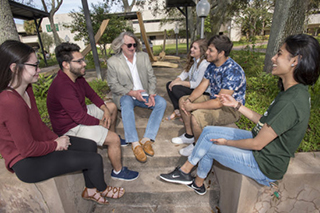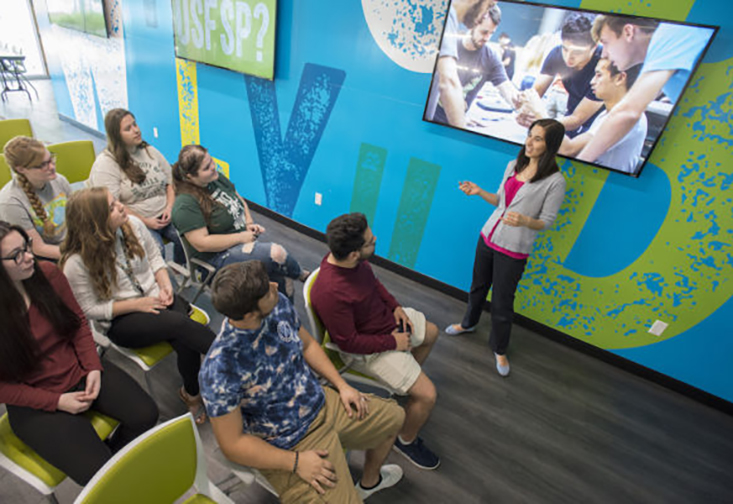A collaborative effort implemented at USF St. Petersburg resulted in a 10-percentage point increase in retention rates for first-time in college students. Retention rates measure the percentage of students who attend college their freshman year and return to the same college the following year. In one year, the retention rate at USF St. Petersburg rose from 65.5 to 75.5 percent.
Prior to this effort, retention rates at the university were erratic, with slow increases over the last six years. Common obstacles to students returning the following year include cost, academic difficulties and not feeling connected to the community.
“The intention of our initiatives was to ensure that we as university staff and faculty have an “eye” on students, share information with one another in a timely way and provide meaningful and helpful responses to support students with a goal of ensuring progress to earning their degree,” said Jacob Diaz, Dean of Students and Director of Housing and Residence Life.
A team comprised of staff from departments spanning academic affairs, student affairs, finance, government relations and enrollment management initiated a collaborative strategy to identify the status of each student in the identified cohort – beginning with Fall 2016 freshman – and intervene proactively regarding obstacles to retention.
The team used a “buckshot” approach to try and drastically improve trends in students returning their sophomore year, by:
- enhancing first-year experiences and mentoring programs,
- creating an Academic Success Coordinator position responsible for weekly data review and coordinating outreach to deliver information that addressed students’ needs from financial aid to advising,
- setting up Archivum system that allowed faculty to refer students to academic advising when they first stop attending classes or start underperforming,
- increasing student activities and programs to enhance connectivity to campus life, and
- initiating small group excursions between faculty and students to connect them with their interests as they start to explore majors.
“In one agile and coordinated effort, we utilized all the best practices that you read about across the U.S.,” said Cynthia Collins, Director of Academic Advising. “We did it all in one year and we retained more students and made more progress because different initiatives impacted different student needs.”

The approach above allowed for the University to identify those students in either academic or financial trouble and streamline support to ensure their needs were being addressed. If a student was having an issue with cash balances, professional staff would reach out and connect them to financial aid for problem solving. Students with academic challenges would receive coaching from academic advisors or given support for completing and turning in required forms on time. And academic advising increased their hours so students had more time to prepare for registration and clear up any holds so they got the classes they wanted the next semester.
The university leveraged existing human and operational resources to create new positions and programs. And by increasing the retention rate by 10 percentage points, it resulted in an estimated $155,478 in tuition revenue, allowing USF St. Petersburg to invest in additional positions and programs that enhance campus life and to support continued advancement of these efforts.
“This initiative caused us to work together and blur the boundaries of the organization with the goal of ensuring that we understood the issues facing each individual student,” said Diaz. “It called for us to set aside our specialized notions of how we carried out our roles and show up as a fellow educator in the spirit of helping students.”
USF St. Petersburg is now incorporating lessons learned from this effort to sustain programs offered to incoming freshman as well as develop sophomore and junior-year experiences.
“This coming academic year we hope to launch robust programs for our second-year students, such as developing faculty-student mentorship opportunities and greater advising focused on choosing majors,” said Carolina Nutt, Director of Compass First-Year Experience program. “The eventual goal is putting in place programs that ensure all our students are successful and graduate on time.”
